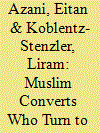| Srl | Item |
| 1 |
ID:
137521


|
|
|
|
|
| Summary/Abstract |
The conflation of ethnic and religious identities, particularly that of Malay and Muslim, has long historical and political roots in Malaysia. Being one of the most safeguarded identity marks in Malaysia, Islam has become part of the core of Malay ethnicity and plays a prominent role in ethnic politics. Muslim converts from ethnic minorities, such as the Chinese and Indians, are therefore faced with social expectation and pressure to ‘become Malay’. This paper discusses the difficulty and improbability of Chinese Muslim identity in the previous literature and the recent development that enables the decoupling of religious and ethnic identities. By looking beyond ethnicity, the most salient social divider in Malaysia, and looking into other possibilities, such as religious identity, this paper aims to paint a picture of social relations and identification that is more complex yet flexible amongst the Chinese Muslim converts in Penang.
|
|
|
|
|
|
|
|
|
|
|
|
|
|
|
|
| 2 |
ID:
187996


|
|
|
|
|
| Summary/Abstract |
Over the past three decades, along with the expansion of the phenomenon of global jihad, we have witnessed a growing trend of converts to Islam integrating into global jihad organizations. Some of these converts constitute an important element in the terrorist infrastructure, globally, and particularly in the West. Some are recruited as foreign fighters into the ranks of the Islamic State or other Islamic extremist organizations. Global jihad organizations have identified the potential of new converts (knowledge of the local culture, the difficulty in tracking them faced by intelligence organizations), and they are investing efforts in every possible arena (physical and digital) to recruit them for terrorist activity. The converts, for their part, are more vulnerable to recruitment for terrorist purposes. The aim of the article is to illuminate the existing phenomenon of radicalization among new converts to Islam and expand the current knowledge base with regard to the variables that affect the growth of this phenomenon and the background and preconditions for such growth. Moreover, this article will attempt to use the above in order to design and develop effective tools for early warning and curbing this phenomenon.
|
|
|
|
|
|
|
|
|
|
|
|
|
|
|
|
| 3 |
ID:
191098


|
|
|
|
|
| Publication |
Lahore, Maktaba Tamir - i - Insaniat, 2002.
|
| Description |
511p.hbk
|
|
|
|
|
|
|
|
|
|
|
|
Copies: C:1/I:0,R:0,Q:0
Circulation
| Accession# | Call# | Current Location | Status | Policy | Location |
| 060403 | 297.09/FAR 060403 | Main | On Shelf | General | |
|
|
|
|
| 4 |
ID:
112609


|
|
|
|
|
| Publication |
2012.
|
| Summary/Abstract |
Are the mechanisms and processes that lead to radicalization different for Muslim converts and non-converts in the United States? While many scholars attempt to explain why people violently radicalize, the theories are diverse and most treat converts and non-converts the same. This study answers this question by categorizing the many radicalization theories into three levels of analysis so that cases of radicalization can be analyzed across and within disciplines. Out of 83 cases studies, individual-level factors are more prevalent among converts than non-converts. Group-level processes similarly affect both groups. Mass-level mechanisms are not significant factors in radicalization.
|
|
|
|
|
|
|
|
|
|
|
|
|
|
|
|